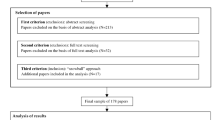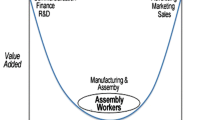Abstract
The insertion of the South African automotive industry into the global mainstream of vehicle manufacturing highlights a number of valuable analytical lessons for developing country automotive economies. The global value chains that dominate the automotive industry have fostered substantial upgrading within the South African automotive industry but pervasive international trends also limit the opportunities for value addition and more substantial increases in vehicle output. Key trends in this regard relate to tightening market conditions in the developed economies into which South African vehicle producers and automotive component manufacturers supply, excess global production capacity and the emergence of new low cost production locations principally in Asia. The benefits to the South African automotive industry of engaging in global value chains are clear but the long term sustainability and development of the industry remain in question. The importance of industrial policy in shaping any national industry's insertion into global value chains, as well as the need for ongoing upgrading and adoption of world class manufacturing standards is stressed as pivotal to maximising the gains that can be derived from insertion into global automotive value chains.
L'insertion de l'industrie automobile sud-africaine dans les flux mondiaux de l'industrie des véhicules permet de tirer un certain nombre de leçons précieuses pour l'industrie automobile des économies en développement. La mondialisation de la chaîne de valeur a encouragé la modernisation substantielle de ce secteur en Afrique du Sud. Mais les tendances internationales limitent par ailleurs les possibilités d'accroître la valeur ajoutée ainsi que la production automobile. A cet égard, les éléments clés sont l'étroitesse des marchés des pays développés clients des producteurs automobiles et des équipementiers sud-africains, un excès de la capacité de production mondiale et l'émergence de localisations de production à bas coût, essentiellement en Asie. L'intérêt de l'industrie automobile sud-africaine à s'engager dans les chaînes de valeur mondiales est clair mais la viabilité et le développement du secteur à long terme demeurent problématiques. L'importance de la politique industrielle dans la détermination de l'insertion d'industries nationales dans les chaînes de valeur mondiales ainsi que le besoin constant de modernisation et d'adoption de normes internationales sont présentés comme des éléments clés pour maximiser les gains tirés de l'insertion dans les chaînes de valeur mondiales du secteur automobile.
Similar content being viewed by others
Author information
Authors and Affiliations
Corresponding author
Rights and permissions
About this article
Cite this article
Barnes, J., Morris, M. Staying alive in the global automotive industry: what can developing economies learn from South Africa about linking into global automotive value chains?. Eur J Dev Res 20, 31–55 (2008). https://doi.org/10.1080/09578810701853157
Published:
Issue Date:
DOI: https://doi.org/10.1080/09578810701853157




